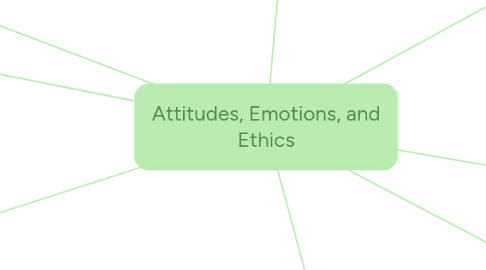Attitudes, Emotions, and Ethics
von Ash Belmontes


1. Organizational Citizenship Versus Workplace Deviance
1.1. Organizational Citizenship Behavior (OCB): Behavior that is above and beyond the call of duty
1.2. Workplace Deviance Behavior: Any voluntary counterproductive behavior that violates organizational norms and causes some degree of harm to organizational functioning.
1.3. Organizational Commitment and Job Satisfaction
1.3.1. Organizational Commitment
1.3.2. Affective Commitment
1.3.3. Continuance Commitment
1.3.4. Normative Commitment
2. Persuasion and Attitude
2.1. Source Characteristics
2.2. Target Characteristics
2.3. Message Characteristics
2.4. Cognitive Routes to Persuasion
2.4.1. Central Route
2.4.2. Peripheral Route
3. Emotions and Moods at Work
3.1. Emotions
3.2. Moods
3.3. Emotional Contagion
3.4. Emotional Intelligence
3.5. Emotional Labor
4. Ethical Behavior
4.1. Acting in ways consistent with one's personal values and the commonly held values of the organization and society.
5. Factor's That Affect Ethical Behavior
5.1. Values
5.1.1. Instrumental Values
5.1.2. Terminal Values
5.1.3. Work Values
5.1.4. Cultural Differences in Values
5.2. Locus of Control
5.3. Machiavellianism
5.4. Cognitive Moral Development
6. Attitudes
6.1. Attitude: psychological tendency expressed by evaluating something with a degree of favor or disfavor.
6.2. The ABC Model: Three components that form the ABC model are Affect, Behavioral Intent, and Cognition.
6.3. Cognitive Dissonance: State of tension produced when an individual experiences conflict between attitudes and behavior.
6.3.1. Direct Experience
6.3.2. Social Learning
7. Attitude Formation
7.1. Attitudes and Behavior
7.1.1. Attitude Specificity
7.1.2. Attitude Relevance
7.1.3. Timing of Measurement
7.1.4. Personality Factors
7.1.5. Social Constraints

